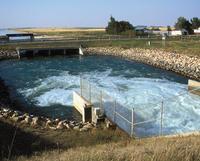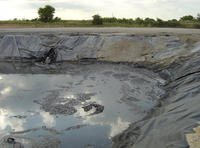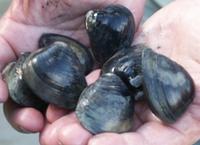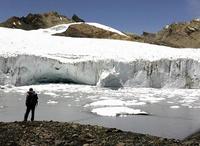-
Canada's water could be answer for anticipated global water shortages

Global demand for water is projected to exceed supplies by 40 percent in 2030, and Canada may be the answer to minimizing water shortages; it is estimated that in the next twenty years, one third of the world will only have half the water it needs to cover daily needs; to prevent these shortages, researchers are scrambling to develop technologies and practices to reduce water consumption, discover new re-processing techniques, and improve infrastructure; Canada’s water experts are well-suited to assist in this effort as they have gained valuable experience from managing 9 percent of the world’s fresh water supplies
-
-
Earth's sixth mass extinction may have already arrived
With the steep decline in populations of many animal species, from frogs and fish to tigers, some scientists have warned that Earth is on the brink of a mass extinction like those that occurred only five times before during the past 540 million years; each of these Big Five saw three-quarters or more of all animal species go extinct
-
-
Toxic metals from Superfund site endangers wetlands in Ventura County

The Environmental Protection Agency (EPA) recently announced that an old metal recycling plant in Oxnard, California, now a federal Superfund site, was leaking lead, zinc, and other dangerous chemicals into nearby wetlands; when the plant closed, it left nearly 700,000 cubic yards of unattended waste laden with heavy metals and small amounts of radioactive thorium; high costs have hindered cleanup efforts and local residents have become frustrated with the drawn out efforts; the wetlands that are endangered by the old metal recycling plant are located in Ormand Beach and are home to several rare and endangered species
-
-
Radioactive waste contaminates drinking water, EPA does nothing

Recent Environmental Protection Agency (EPA) documents show that Pennsylvania’s drinking water has been contaminated with radioactive waste from natural gas drilling; energy companies have been extracting natural gas with a new drilling technique called “hydrofracking”; this process results in millions of gallons of wastewater that is contaminated with dangerous chemicals like highly corrosive salts, carcinogens, and radioactive elements; EPA documents reveal the process has been contaminating drinking water supplies across the country with radioactive waste; in Pennsylvania more than 1.3 billion gallons of radioactive wastewater was trucked to plants that could not process out the toxins before it released the water into drinking supplies
-
-
Ancient catastrophic drought a warning about current warming trends
Extreme megadrought in Afro-Asian region likely had consequences for Paleolithic cultures; the records show that one of the most widespread and intense droughts of the last 50,000 years or more struck Africa and Southern Asia 17,000 to 16,000 years ago; the “H1 megadrought” was one of the most severe climate trials ever faced by anatomically modern humans; Africa’s Lake Victoria, now the world’s largest tropical lake, dried out, as did Lake Tana in Ethiopia, and Lake Van in Turkey; the Nile, Congo, and other major rivers shriveled
-
-
Common clam to help clean oil-filled waters

Clams are bottom-dwelling filter feeders, obtaining nutrients by filtering the water around them; researchers at Southeastern Louisiana University are studying the lowly Rangia clam to determine whether the organism can contribute to helping clean oil-polluted waters
-
-
A warming world would add billions to shipping costs
As anyone with a boat knows, many sorts of marine life can attach themselves to a hull below the waterline; on a large ship, the weight of such hitchhikers — everything from algae to barnacles to small colonies of coral — can weigh as much as ten tons; the U.S. shipping industry spends more than $36 billion each year in added fuel costs to overcome the drag induced by clinging marine life or for anti-fouling paint that prevents that life from hitching a ride in the first place; global warming will see the problem of hull-clinging creatures worsen substantially
-
-
States challenge federal policy on nuclear waste storage

The search for a permanent solution to the storage of nuclear waste continues as three states sued the Nuclear Regulatory Commission (NRC) last week over its new policy on spent fuel; in December NRC issued a new policy stating that nuclear waste could be safely stored at a power plant for sixty years after a reactor went out of service; the issue of nuclear storage has become increasingly contentious after the Obama administration ruled out the use of a Department of Energy storage site in Nevada in 2009; nuclear plants have been forced to turn temporary on-site storage into long-term facilities as no permanent site has been built; the Obama administration launched a commission to find alternatives for the permanent nuclear storage site in Nevada that it cancelled
-
-
Drought in China threatens wheat crop and send global prices soaring

UN Food and Agriculture Organization (FAO) warned that a severe drought was threatening China’s wheat crop and could result in shortages of drinking water; analysts fear that wheat prices could soar even higher if China were to begin importing large quantities of food to feed more than a billion hungry mouths; wheat prices are already at record highs and have sparked food related protests around the world; surging prices are partially responsible for Egypt and Tunisia’s recent mass uprisings; China’s Shandong province, a major agricultural region, has only received fifteen percent of its normal rain levels; in dire terms Chinese state media reported that “land is drying out, and the crops are dying”
-
-
U.S. unprepared for climate-induced disease outbreaks
Officials warn that the United States is not equipped to handle the spread of infectious diseases caused by climate change; little investment or progress has been made in bolstering disease detection and response capabilities in the United States, despite warnings from intelligence agencies; increased heat, humidity, and rainfall have caused the spread of mosquitoes and other bugs which carry deadly tropical diseases to new areas where people have yet build up a resistance; the United States is now experiencing outbreaks of dengue fever and West Nile virus; in 2010 the CDC reported 110 deaths and 1,356 cases of West Nile virus in the United States; intelligence agencies also worry about the potential for the spread of these diseases to destabilize fragile nations across Asia and Africa
-
-
Melting glaciers threaten Peru

Rising temperatures have caused glaciers in Peru to melt at alarming rates; Peru depends heavily on rivers fed by glaciers to provide drinking water, irrigation, and electricity; some scientists estimate that in ten years, whole glaciers will disappear entirely from the Andes; millions of Peruvians depend entirely on the glacier fed rivers as their primary source for water; the United States fears that water, food, and power shortages in Peru could cause stability and spark conflict across the region
-
-
Protecting vital infrastructure as sea levels rise
As the world gets warmer, sea levels are rising; it has been happening at a snail’s pace so far, but as it speeds up more and more low-lying coastal land will be lost; at risk are many of the world’s cities and huge areas of fertile farmland; the sea is set to rise a meter or more by the end of this century, swamping much vital infrastructure and displacing hundreds of millions of people; scientists are looking at various ways to slow down or reverse the rise in sea levels — and of ways of coping with its consequences
-
-
Asia faces climate-induced migration crisis
Asians accounted for 89 percent of the 207 million people affected by natural disasters globally last year; Asian governments are currently focused on mitigating weather changes induced by climate change, but a new report from the Asian Development Bank says they should start laying down policies and mechanisms to deal with the projected population shifts; weather changes such as significant temperature increases, changing rainfall patterns, greater monsoon variability, sea-level rise, floods, and more intense tropical cyclones would force millions of people to flee their homes to safer havens within countries and across borders
-
-
Curbing price speculation to prevent food riots
Global food prices are hitting record highs in part due to environmental disasters and increased financial speculation; to secure food supplies and prevent riots, agriculture ministers are proposing regulations on agricultural speculation; world food prices rose 25 percent last year while the price of grain has soared 79 percent; in 2008 sharp increases in food prices sparked riots and political instability in thirty countries including Egypt and Haiti
-
-
Air laser will sniff bombs, pollutants from great distance
Princeton University engineers have developed a new laser-sensing technology that may allow soldiers to detect hidden bombs from a distance and scientists better to measure airborne environmental pollutants and greenhouse gases; the new technique differs from previous remote laser-sensing methods in that the returning beam of light is not just a reflection or scattering of the outgoing beam; it is an entirely new laser beam generated by oxygen atoms whose electrons have been “excited” to high energy levels
-
- All
- Regional
- Water
- Biometrics
- Borders/Immig
- Business
- Cybersecurity
- Detection
- Disasters
- Government
- Infrastructure
- International
- Public health
- Public Safety
- Communication interoperabillity
- Emergency services
- Emergency medical services
- Fire
- First response
- IEDs
- Law Enforcement
- Law Enforcement Technology
- Military technology
- Nonlethal weapons
- Nuclear weapons
- Personal protection equipment
- Police
- Notification /alert systems
- Situational awareness
- Weapons systems
- Sci-Tech
- Sector Reports
- Surveillance
- Transportation
Advertising & Marketing: advertise@newswirepubs.com
Editorial: editor@newswirepubs.com
General: info@newswirepubs.com
2010-2011 © News Wire Publications, LLC News Wire Publications, LLC
220 Old Country Road | Suite 200 | Mineola | New York | 11501
Permissions and Policies
Editorial: editor@newswirepubs.com
General: info@newswirepubs.com
2010-2011 © News Wire Publications, LLC News Wire Publications, LLC
220 Old Country Road | Suite 200 | Mineola | New York | 11501
Permissions and Policies
